Perhaps We Don’t Need Quite This Much Internet
The world doesn't stop when you go offline, and that's just fine
“And, if it was ever thus, how did it ever get to be thus in the first place? The digital world is new, and the real gains and losses of the Internet era are to be found not in altered neurons or empathy tests but in the small changes in mood, life, manners, feelings it creates—in the texture of the age. There is, for instance, a simple, spooky sense in which the Internet is just a loud and unlimited library in which we now live—as if one went to sleep every night in the college stacks, surrounded by pamphlets and polemics and possibilities…. To see that that is so is at least to drain some of the melodrama from the subject. It is odd and new to be living in the library; but there isn’t anything odd and new about the library.” — Adam Gopnik, in 2011
“The first reason I avoid news is because I suffer, like most people today, from Constant News Negativity, or CNN for short, coupled with debilitating FOX (Frenzy of Outright Exaggeration), both of these results of the Information Anxiety Complex (IAC). I would struggle through it, of course, because a good and concerned citizen today must follow every news story from everywhere in the world, no matter how suicidal the onslaught makes him, but my shrink says if I increase the dosages of my anxiety medication any further, they will start interfering with my depression medications.” — Shalom Auslander, several weeks ago
Last week I returned from a two-week trip rafting down the Grand Canyon, and it was an amazing, arguably life-changing, experience. I feel incredibly fortunate to have done it: the trip had been on my bucket list for a long time, and it’s not cheap, and permits are hard to come by. And two weeks out of “normal life,” of course, is hard for almost anyone to find. But if it’s something you’re at least intrigued by, and able to do — go, I say. Go.
One of the most remarkable things about the trip was that we didn’t have any internet. Fifteen nights without data or wifi! The last time I went more than a few days offline was when I visited Cuba for a week immediately after the 2016 US presidential election. (And what a sweet time that was to lose touch of the world’s collective anxiety.)
And before 2016? I can’t think of a time I’ve been offline for more than four days or so since… the internet really came about. Can you?
My web sabbatical didn’t stop there. When I got home, I underwent an extensive cornea transplant surgery (organ donations really can change lives 💪), which means I’ve limited my screen time for the past week since, well, it hurts like hell.
Which also means I’ve been writing this week’s post in small bursts, with the occasional help of an eye patch. (What’s a pirate’s favorite letter? Yar, it be the C 🏴☠️.)
And all of this means that I’ve had a lot of time the past three weeks to reflect on my relationship with the internet. And it may not be the healthiest, come to think of it!
I first read the Gopnik essay quoted above around ten years ago, and loved it — it rang more true than anything I’d read about the internet up to that point. That line, that libraries aren’t new, but “it’s odd and new to be living in the library” — anything you want, whenever you want it. Bo Burnham’s brilliant “Welcome to the Internet” might be the best encapsulation of the feeling now.
But I think this misses another layer, especially today.
It’s that the library now demands things of us. As Auslander jokes, “because a good and concerned citizen today must follow every news story from everywhere in the world, no matter how suicidal the onslaught makes him” (emphasis mine) — because our Netflix queue is growing, those saved podcasts won’t play themselves, and those songs will be lost forever when Discover Weekly refreshes — because there are messages awaiting a response by email, and text, and Instagram and Messenger and WhatsApp and — because, as Salman Rushdie writes in his recent memoir,
“If a thing is not made public, it doesn’t really exist. Your dog, your wedding, your beach, your baby, your dinner, the interesting meme you recently saw—these things need, on a daily basis, to be shared. Where attention has become the thing most hungered for, where the quest for followers and likes is the new gluttony…”
Rushdie’s larger point is about the evaporation of privacy in our modern lives, but note his words: “these things need, on a daily basis, to be shared.”
It’s exhausting.
I took a lot of photos in the Grand Canyon. Too many, embarrassingly many. It occurred to me shortly into the trip that I should (note that word, “should”) post them to Instagram once it ended.
But sometime after that — after a few days on the river, taking photos without the option to post them anywhere — I stopped caring. Maybe one day I’ll post them, and maybe I won’t. I almost didn’t want to include any here, because it felt like cheating.
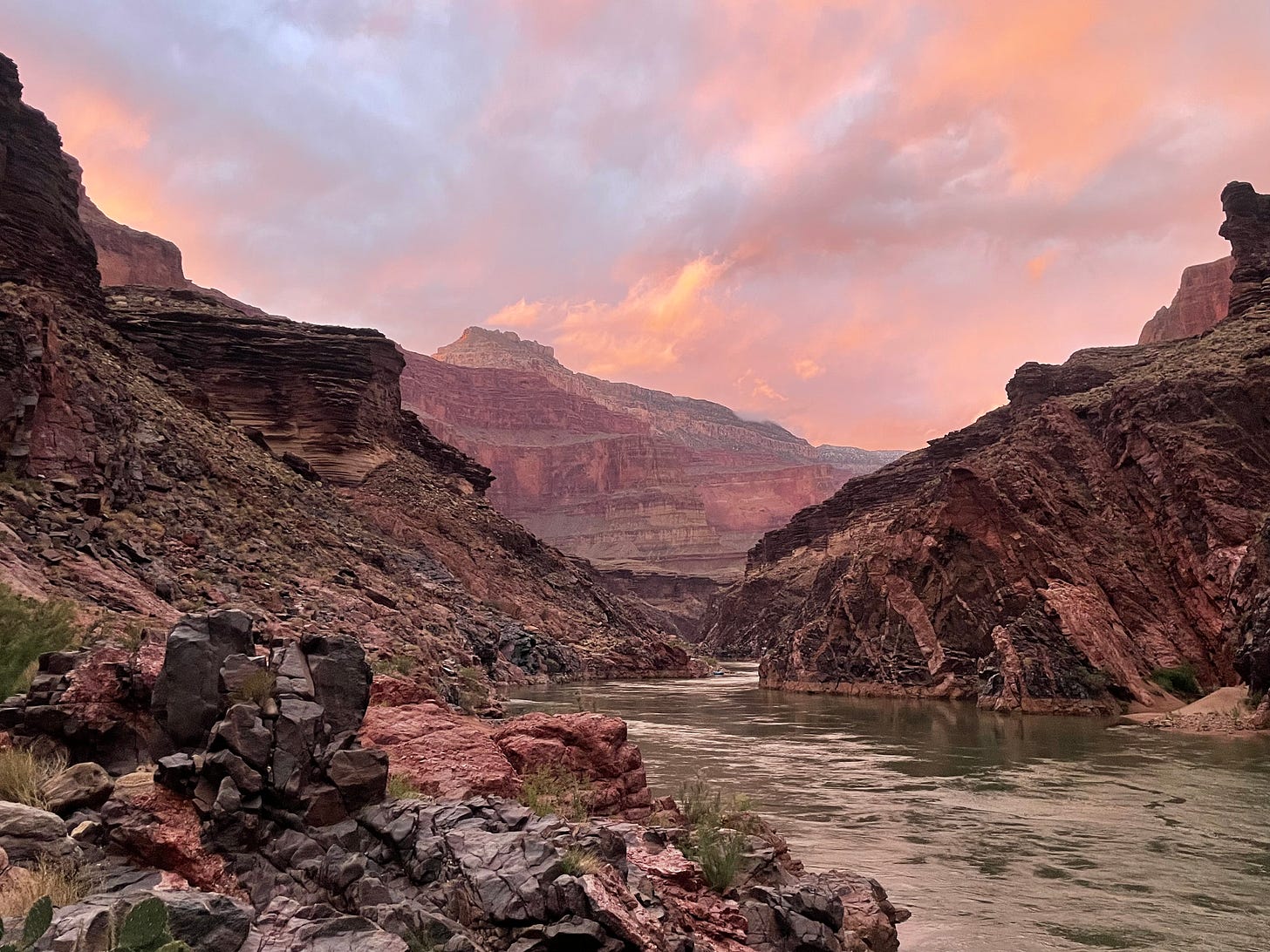
I first read that Gopnik essay in a graduate school class at the University of Washington. It was called “Mindful Tech,” and taught by David Levy, who later published a book based on his experience teaching it — a book I highly recommend for anyone looking to become less-online today.
Each week in class, we were tasked with observing our own online behaviors in increasingly revealing manners: keeping journals of our internet usage, estimating time spent on different sites and apps, and even recording ourselves and our screens for one-hour stints of supposedly “productive” internet activity.
The best part was that we didn’t just observe our own behaviors: each week we came together to share what we’d found. And we were struck by the commonality of our experiences, the baffling ways we lost track of time and purpose online. We joked that it felt like a therapy group, like a weekly meeting of Internet Addicts Anonymous.
The last weekend of the class, we were assigned to abstain completely, for an entire weekend, from a website or app we felt we used too much. This was 2014, and many of us chose Facebook.
I’m embarrassed to admit how terrified many of us were to leave the platform, even for 48 hours. But when we reconvened the following week, we all shared a remarkable thing: most of us reported a kind of withdrawal the first day, a sense of FOMO, a constant desire to open the app to see amazing things we were missing.
But then, a day later, most said we hardly thought about the site at all. Most of us, in fact, felt really good not thinking about it. And even that weekend was enough to break the habit for many of us, for good.
There was much discussion on our trip about our disconnection from the internet and outside media — and admittedly, even personal contacts, responsibilities and worries. “Rim World” was how some of our guides referred to it.
Before the trip — just as classmates and I had feared the weekend-long break from Facebook a decade before — friends and I were anxious to give up our connections to the world for such a long time. We “joked” about a new pandemic unfolding without our knowledge, arriving at our take-out point sixteen days downriver to a bus driver swaddled in face mask and gloves, brandishing a Lysol can like a censer. We wondered, half-seriously, if a new world war might be unfolding on earth as we meandered down the river a mile below its surface.
But we grew accustomed to our internet-free life quickly. We fell asleep faster, and stayed asleep longer, and slept more deeply. (Spending all day outdoors surely helped, but I can’t help but think the lack of internet played a part.) We read books, talked, and simply watched: the stars, the sun, the rocks, the flowering desert plants.
One evening a bighorn sheep appeared across the river from our camp, and spent several hours munching on the greenery near the river’s edge. Nearly the whole camp walked the few hundred yards upriver to get a better view of it, bringing cameras and binoculars and beers. We sat watching it for minutes, half an hour, more. Because where else did we have to go — and what else was there to do? Someone remarked the next morning how great the “Ram TV” had been.
“If sleep is the apogee of physical relaxation, boredom is the apogee of mental relaxation. Boredom is the dream bird that hatches the egg of experience. A rustling in the leaves drives him away.” — Walter Benjamin
Days before we reached the end of the trip, friends and I discussed the dread we felt at the thought of turning on our phones once we left the river. One friend was calling his wife as we drove to the put-in place on day one, up until the very minute he lost cell reception. Sixteen days later he was asking everyone on the trip — half-jokingly but also half-sincere — how long was acceptable to wait to turn it back on once we reached the “rim world,” so he could call her again.
We joked that he should throw his smartphone in the river and buy a “dumb” feature phone in Flagstaff, and he seemed to consider it.
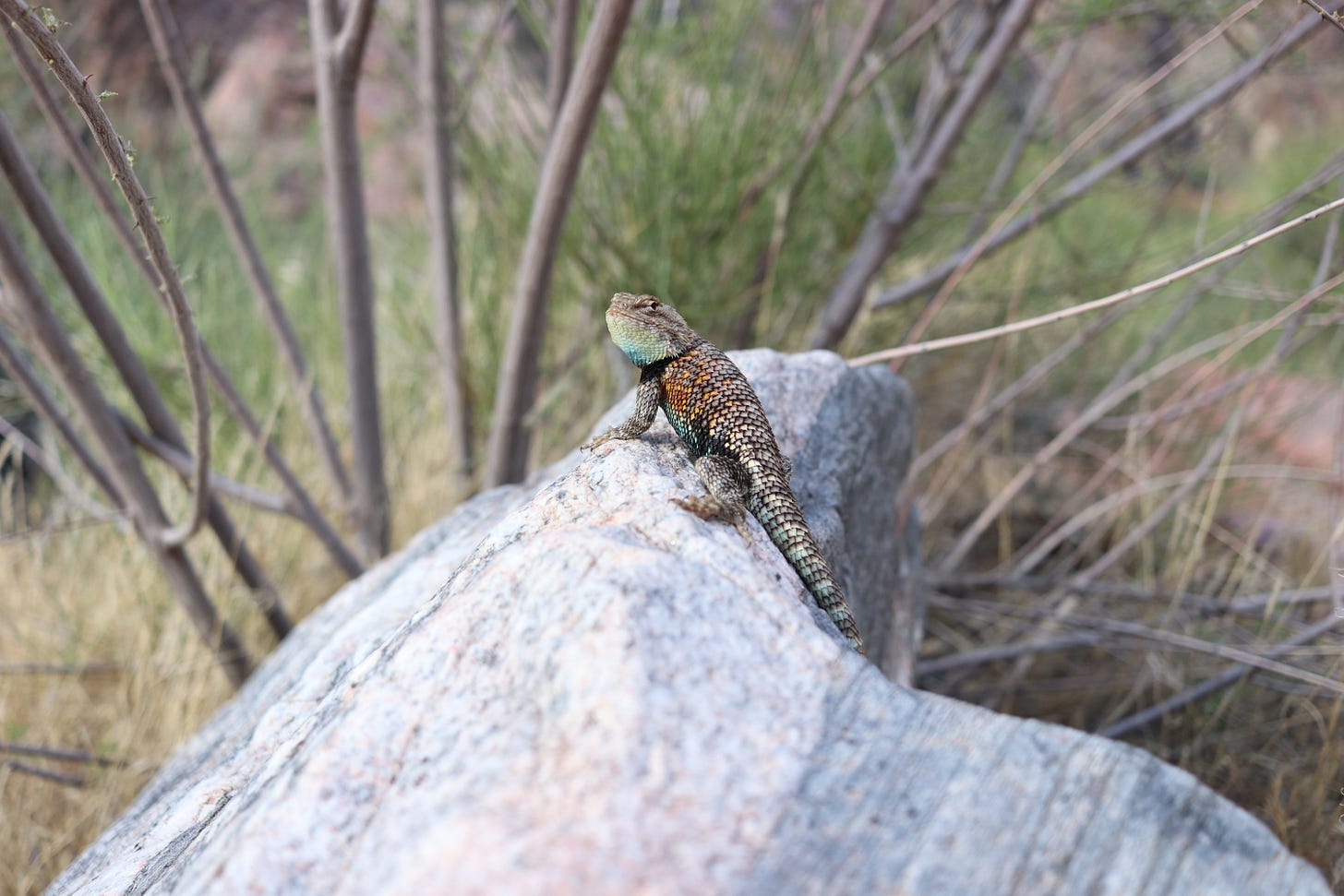
A few members of the rafting trip only joined for half the time — either joining at the start and hiking up Bright Angel trail on day eight, or hiking down to join us for the trip’s remainder that same day. Reluctantly, I asked one of the newcomers if we’d missed any big news from the surface. He shrugged, and said “same bullshit.”
I wanted to believe him — but thought, perhaps, he just didn’t pay much attention to the news. But when I finally turned my phone off airplane mode when we left the river, I saw he’d mostly been right.
The three top news stories I remembered from the start of the trip were:
Israel threatening to invade Rafah
Crackdowns and controversies around pro-Palestine protests on US campuses
Trump whining outside his New York City courtroom
And when I checked the news again, fifteen days later, the top three stories I saw were:
Israel threatening to invade Rafah
Crackdowns and controversies around pro-Palestine protests on US campuses
Trump whining outside his New York City courtroom
This sounds glib, and I don’t mean to be. Gazans and Israelis and Ukranians and Russians died while I was in the canyon. And countless other atrocities visited countless individuals all around the globe, too.
I’ve been to Gaza, and have friends there. I’m grateful to (most of) the people protesting, politicking, and doing whatever they can to end the conflict. World War III didn’t start while we were in the canyon, and I’m grateful that people — many of them, working hard — prevented that from happening. I plan to be quite politically involved this year, as I have in recent years, and believe that democracy doesn’t function without informed people making their voices heard. And I understand it’s unrealistic, and perhaps even irresponsible in a year like this one, to completely exempt yourself from the workings of society, and even its news.
But maybe we don’t need to be this connected, all of the time.
Throughout the trip, I thought about how our existence on the river was not all that dissimilar from that of most humans, for most of our species’ long history. We woke each morning concerned with only where to go, what to eat, and how to get along with the small group of people in our immediate vicinity. And that was it.
And wow, did that feel good for just a little while.
Song of the Week: Ferde Grofé — Grand Canyon Suite

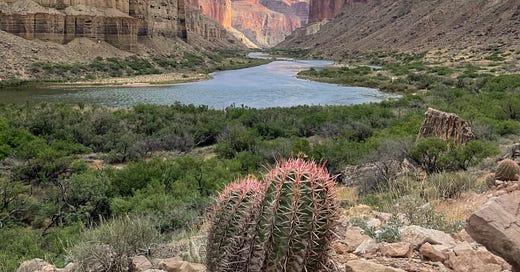


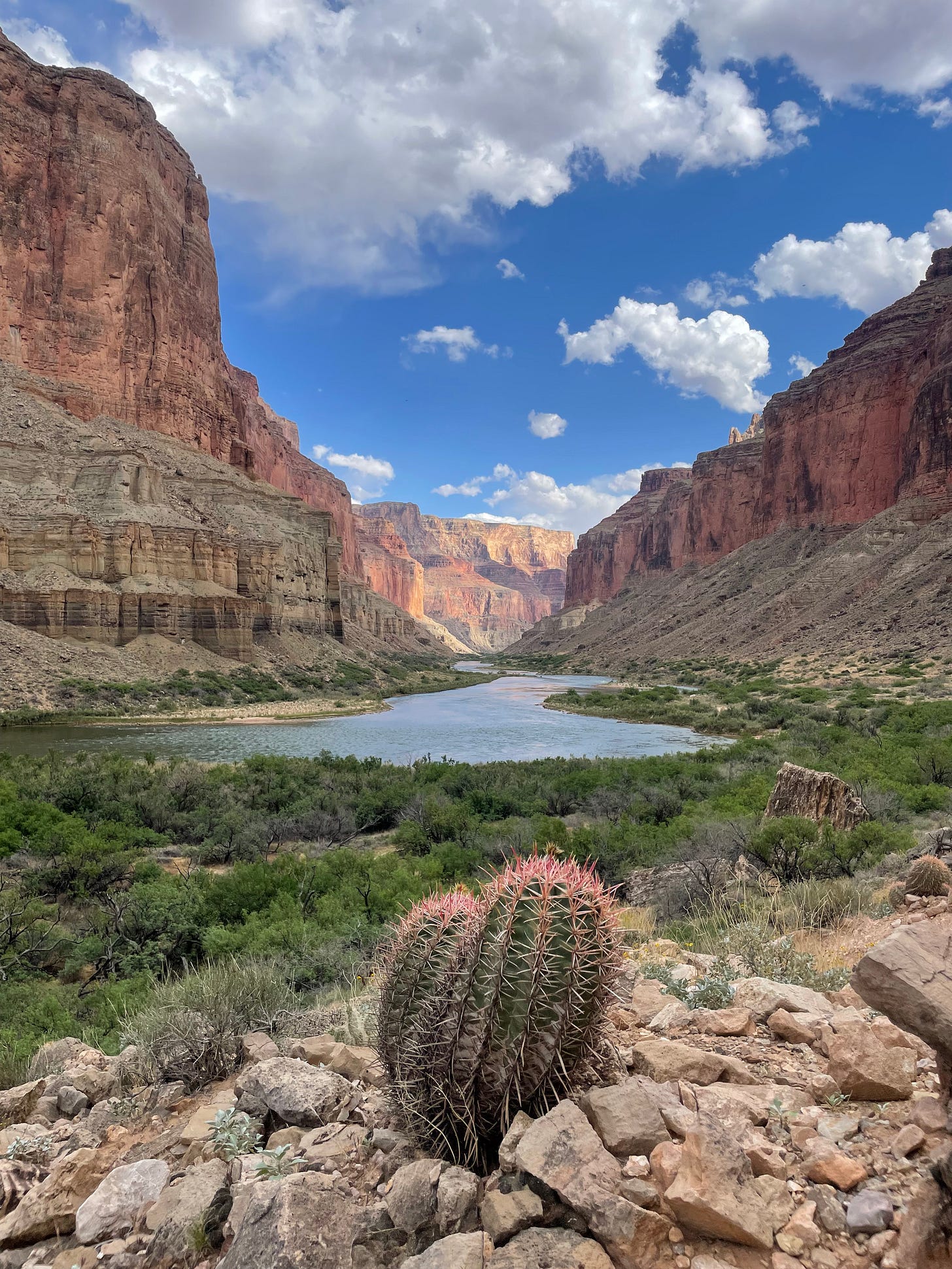
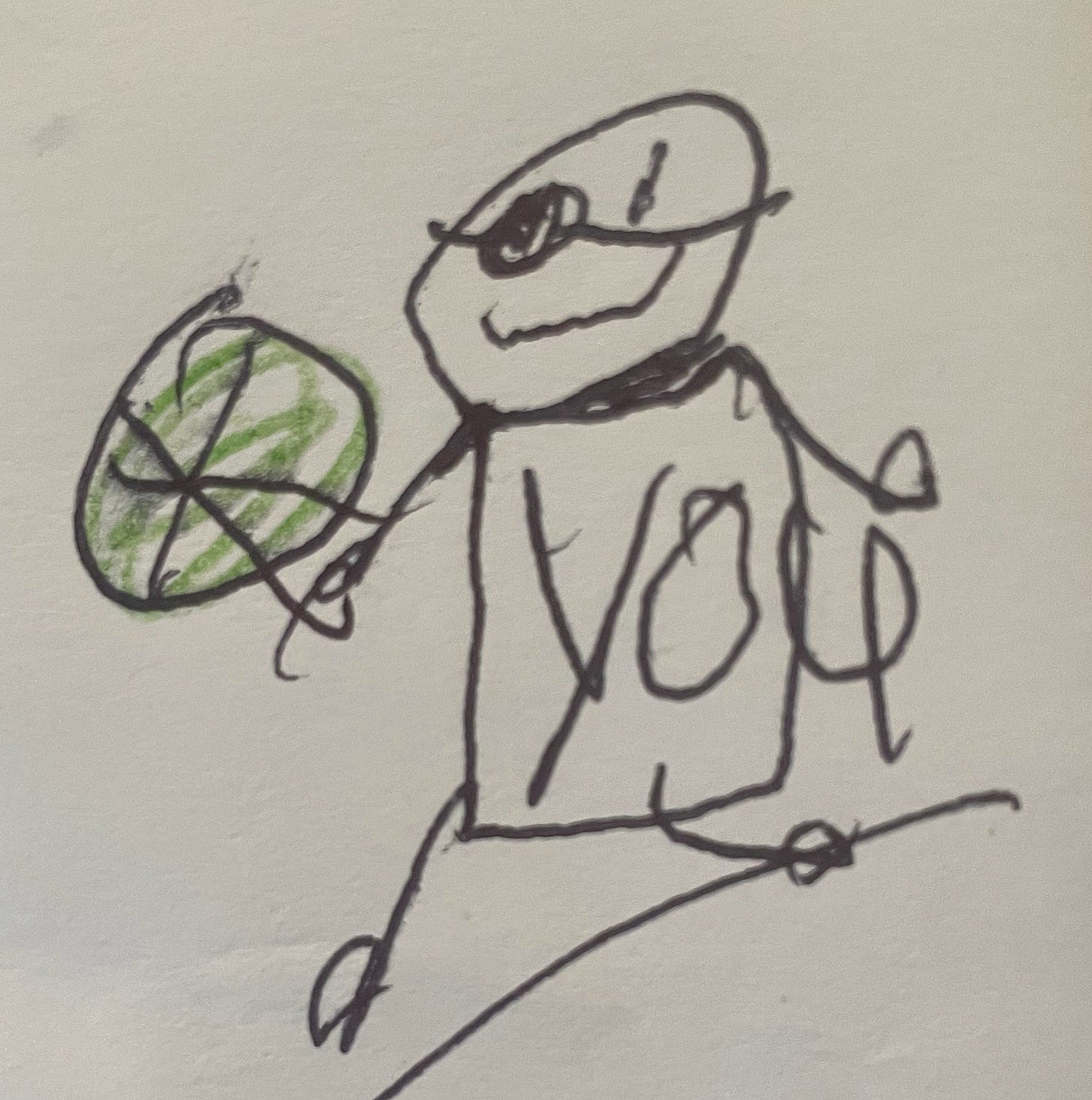
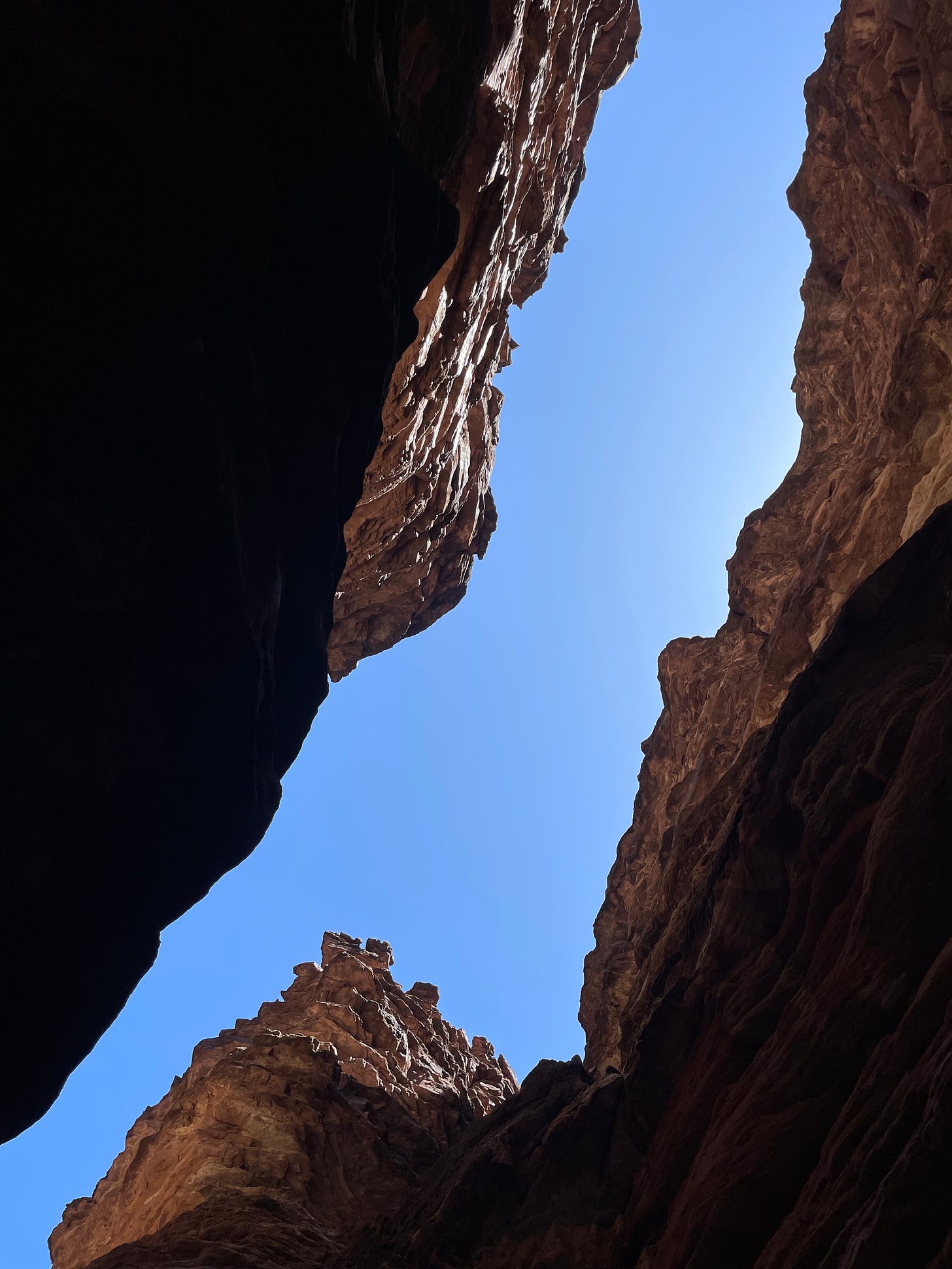
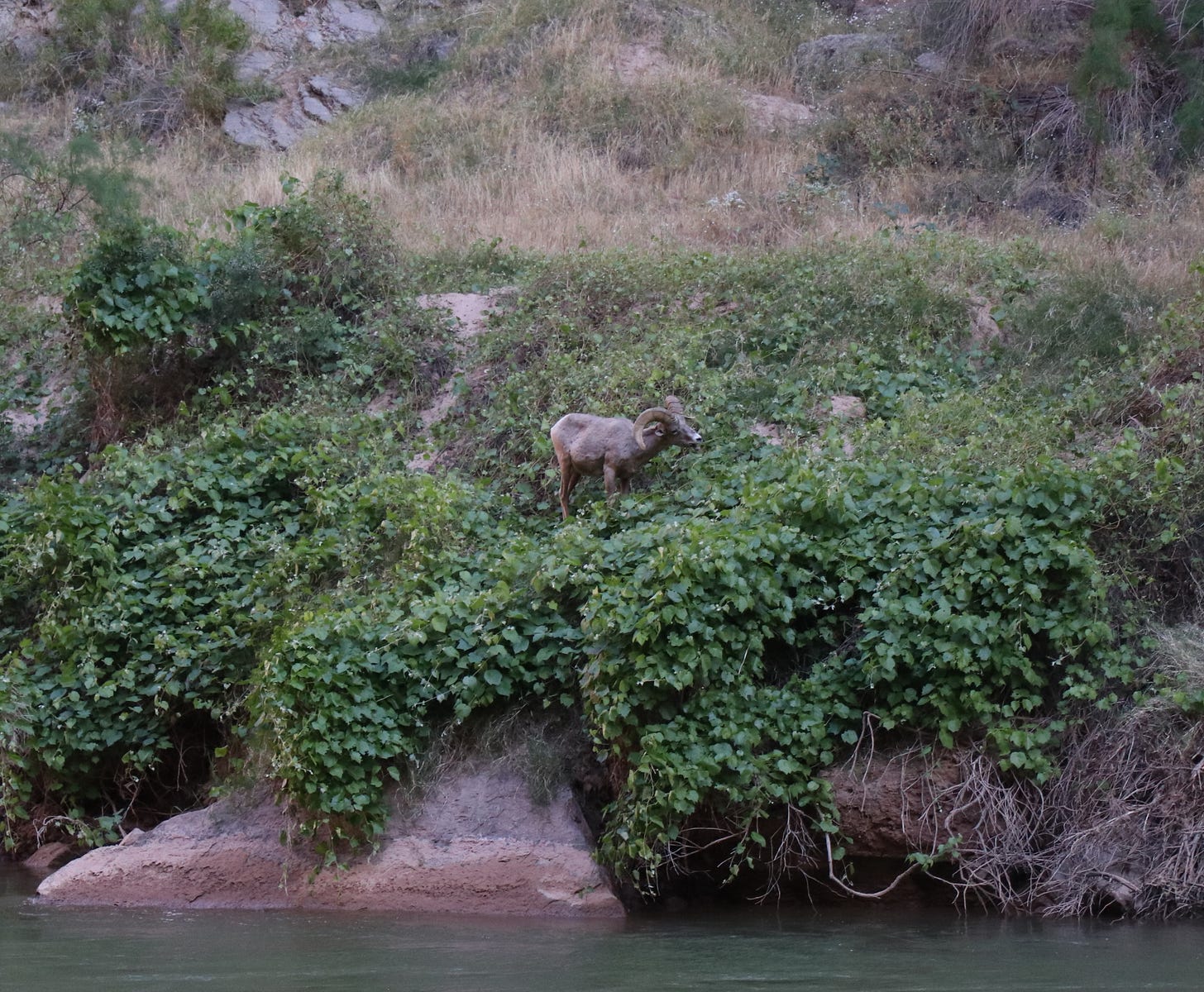
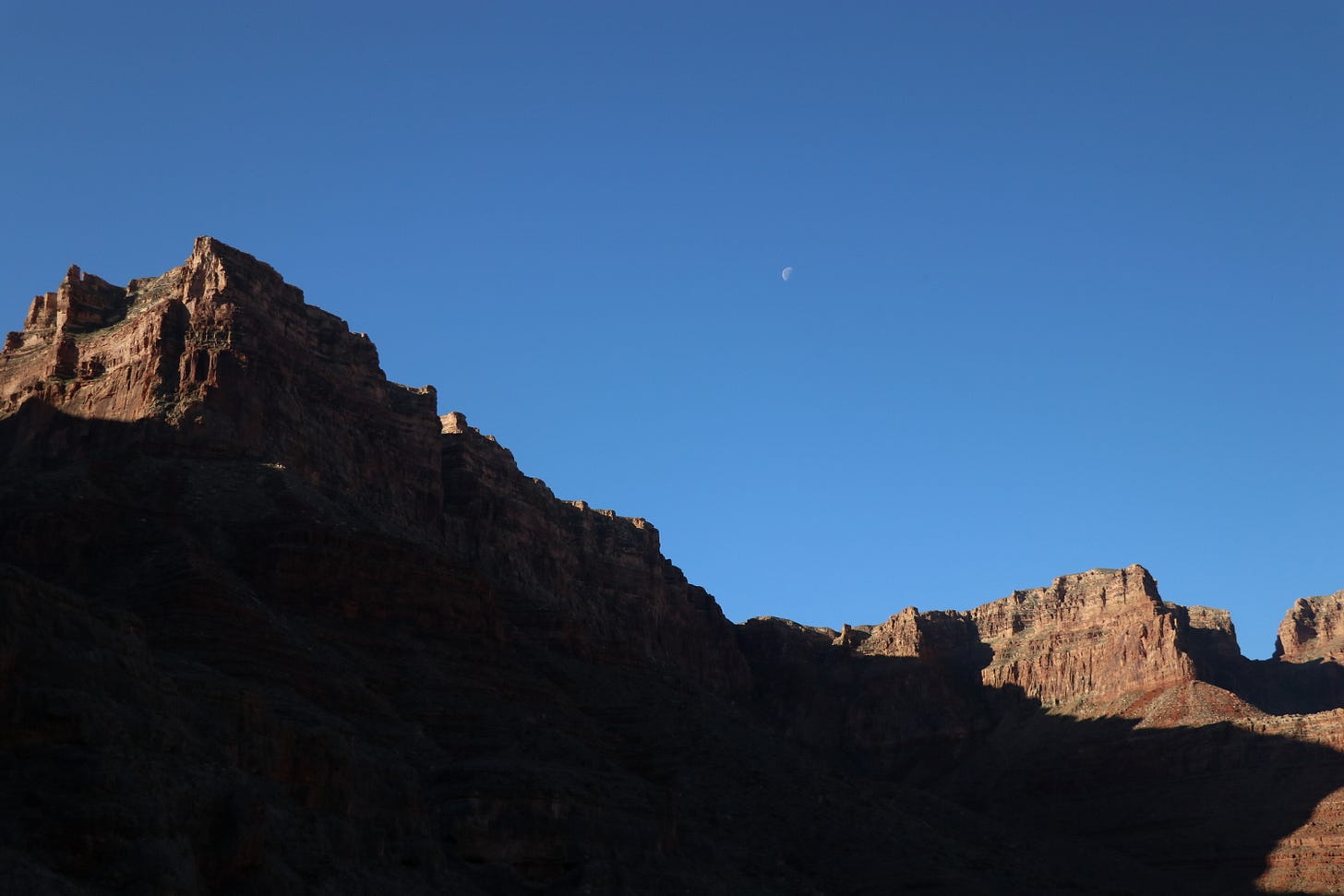
First of all that Auslander quote was worth the price of admission.
It felt good for just a little while, how would it feel for a long while? Most of a life? All of a life? I realize the scope of the blog isn't a pontification on life but I can't help thinking about that stuff.
Lastly, regarding Rushdie, maybe we should get used to shit not existing like...you know...all of our ancestors didn't exist by today's standards.